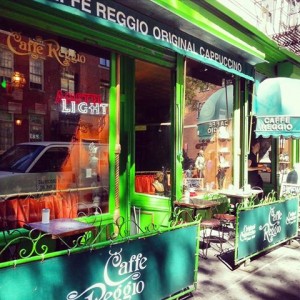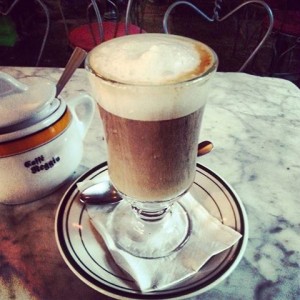
For one evening last month, Greenwish Village’s Caffe Reggio changed its historic image. The usually full outdoor tables were completely bare while the cafe’s indoor tables were crowded with people nursing coffees or teas. Instead of enjoying fresh cappuccinos and casual dinner, coffee shop goers listened to poetry performances.
Opened in 1927, at 119 McDougal Street, Caffe Reggio is the oldest coffee house in Greenwich Village. After founder Dominico Parisi quit his job as a barber, he imported a $1000 Italian espresso machine and opened Reggio, the first cafe to serve cappuccino in the United States. Once neighbor with Cafe Chino, Cafe Wha and theaters like the Judsons Poets Church, sports bars and comedy clubs now surround the West Village cafe.
Reggio is reminiscent of Renaissance Italy. The interior is comprised of over 80 works of art, including a Caravaggio painting, a bench with the crest of the De Medici family – an homage to the powerful Italian political dynasty – and the famed espresso machine itself, covered with angelic figures, horses and bronze metal works. Immersed in an ever-changing neighborhood, Caffe Reggio remains a haven for writers, art connoisseurs and history enthusiasts. Beat writers like Jack Kerouak and Gregory Corso sat on ornate green chairs to write on marble topped tables, now occupied by today’s aspiring writers, smoking cigarettes and watching the passing tourists.
A regular at the cafe, Sherri Felt Dratfield, organized the event and gathered seven poets, whose chapbooks were recently published by Finishing Line Press, a small independent publisher located in Georgetown, Kentucky. Dratfield, a Finishing Line Press poet and West Village resident, was inspired to write most of the poems in her first chapbook, “The City.”

The poets frequently used traditional writing styles like sestinas, which is a fixed verse form, and ekphrasis, the written visual description of a work of art. The poems were often prefaced with the writer’s inspirations, like recent trips to Italy and artwork from the MoMA.
Poet Red Washburn was one of the few poets of the night who read free verse poems with current and accessible subject matters. Her first book, “Crestview Tree Woman,” explores feminist and spiritual themes. John J. Trause, who published the book “Eye Candy for Andy: 13 Most Beautiful… Poems for Andy Warhol’s Screen Tests,” also read from original short poems. Trause completed his reading with a performance art piece, putting on sunglasses while singing along to a German song set on a portable CD player.
Leah Maines, senior editor at Finishing Line Press, joined the publishing house in 2002. Since then, the once small publisher has received over 3,500 book submissions and published 35 books a year, while most independent publishers publish five or six books each year. Maines encourages poets to promote their work themselves.
“Everybody gets lots of rejection letters, it’s normal,” she said. “I used to line my office walls with mine. You just have to keep going.”
Maines published and promoted her first chapbook, “Looking to the East with Western Eyes,” by herself in 1998. She called radios and cafes, and eventually her book became a bestseller. She believes that the role of a publisher is limited when it comes to promoting authors, due to lack of funds, and readings to promote writers.
Caffe Reggio owner Fabrizio Cavallacci said that if more poets took the initiative to organize readings, he might be more responsive to hosting readings at Reggio.
“I wished we could have more readings. Maybe one or two a month,” said Fabrizio Cavallacci. “Even though a lot of the writers’ family and friends came and ordered, it still disrupted business. I need to pay my bills.”
Tamar is a poet, writer, New York-lover and dweller. She studies jounalism+design at The New School.







Leave a Reply